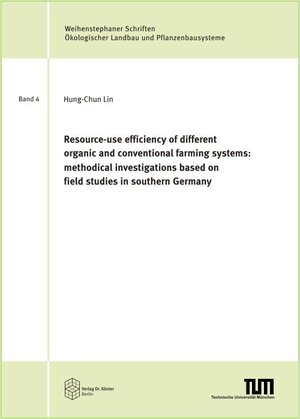Resource-use efficiency of different organic and conventional farming systems:
methodical investigations based on field studies in southern Germany
von Hung-Chun LinIncreasing the resource-use efficiency (ReUE) is one of the main challenges of agriculture and agricultural science in the 21st century. Resource-use efficiency is usually defined as output (e. g. crop yields, energy content in agricultural products) in relation to input (e. g. nutrients, water, energy).
Resource-use efficiency can be analyzed at different system levels: from molecular mechanisms, single plants, to crop stands, crop rotations, farms, and even regional, national and global levels.
The first objective of this thesis is the development of new methodical approaches and the adaptation of existing methods to analyze agricultural resource-use (energy-, nitrogen- and land-use) efficiency of organic and conventional farming systems including agroforestry systems.
The second objective of this thesis is the test of the new approaches with case studies based on long-term field experiments under the soil-climate and social-economic conditions of southern Germany at the Scheyern Research Farm. The applicability of the approaches on different farming systems (high-input conventional arable farming, low-input organic arable farming, organic mixed farming and conventional and organic agroforestry systems) and the interpretability of the results are key issues.
The third objective of this thesis is to analyze and compare the energy-use efficiency, nitrogenuse efficiency, land-use efficiency and other related indicators of the different farming systems.
Resource-use efficiency can be analyzed at different system levels: from molecular mechanisms, single plants, to crop stands, crop rotations, farms, and even regional, national and global levels.
The first objective of this thesis is the development of new methodical approaches and the adaptation of existing methods to analyze agricultural resource-use (energy-, nitrogen- and land-use) efficiency of organic and conventional farming systems including agroforestry systems.
The second objective of this thesis is the test of the new approaches with case studies based on long-term field experiments under the soil-climate and social-economic conditions of southern Germany at the Scheyern Research Farm. The applicability of the approaches on different farming systems (high-input conventional arable farming, low-input organic arable farming, organic mixed farming and conventional and organic agroforestry systems) and the interpretability of the results are key issues.
The third objective of this thesis is to analyze and compare the energy-use efficiency, nitrogenuse efficiency, land-use efficiency and other related indicators of the different farming systems.







